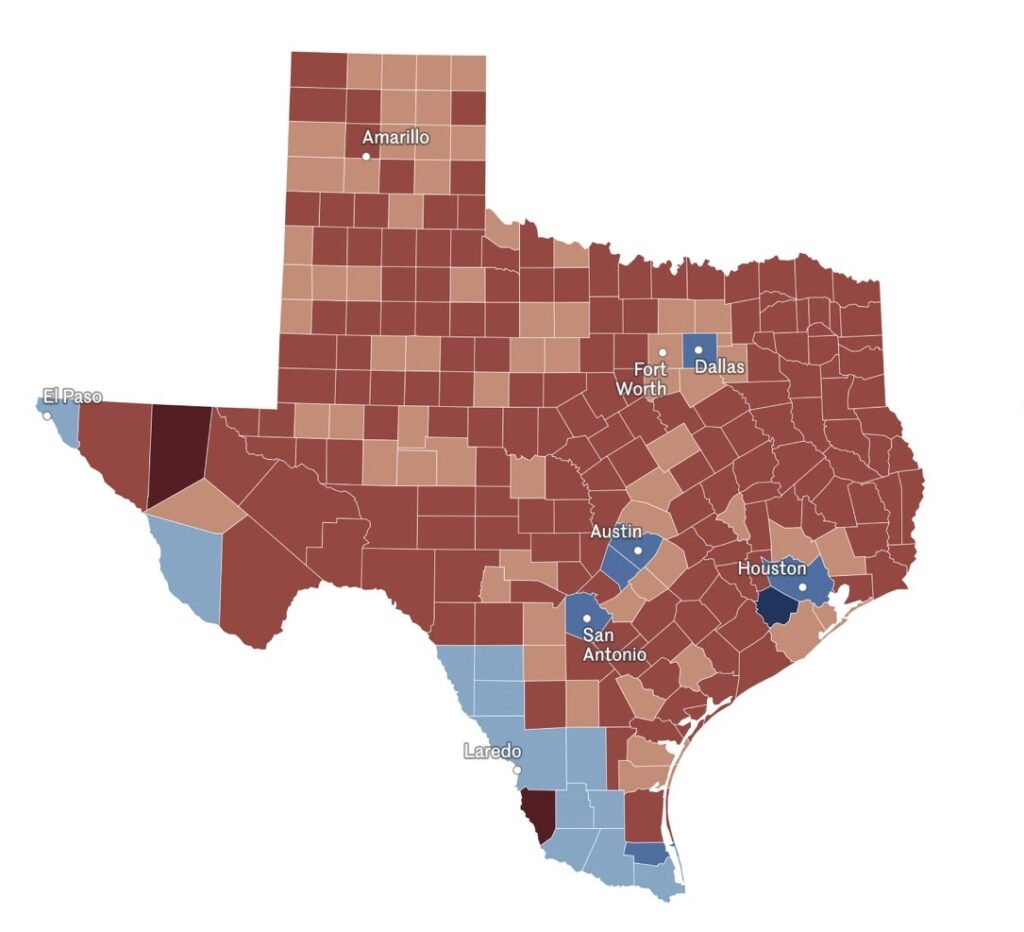The Texas Republican primaries are a crucial part of the American political landscape, shaping the future of the state’s leadership and reflecting broader trends within the Republican Party. This article delves into the intricacies of the Texas Republican primaries, exploring their significance, processes, key players, and impact on the political landscape.
Overview of the Texas Republican Primaries
Importance of the Texas Republican Primaries
The Texas Republican primaries hold immense importance in the national political arena, given Texas’s size, influence, and conservative leanings. As one of the largest states in the U.S., Texas wields significant power in shaping the direction of the Republican Party and impacting national policies.
The primaries serve as a battleground where candidates compete to secure their party’s nomination for various positions, including governorships, congressional seats, and other elected offices. Winning in the Texas Republican primaries often signals a candidate’s viability and sets the stage for broader electoral success.
Key Players in the Texas Republican Primaries
The Texas Republican primaries attract a diverse array of candidates vying for party nominations, ranging from seasoned politicians to newcomers seeking to make their mark on the political scene. Notable figures within the Texas Republican Party often play a pivotal role in endorsing candidates and mobilizing support among voters.
Candidates must navigate complex political landscapes, appealing to different factions within the party while staying true to core conservative values that resonate with Texas voters. Understanding the dynamics of key players and interest groups is essential for crafting effective campaign strategies in the Texas Republican primaries.
- Texas Republican Party officials;
- Influential donors and interest groups;
- Grassroots activists and volunteers.
Process of the Texas Republican Primaries
The process of the Texas Republican primaries involves several stages, starting with candidate filings and culminating in election day where voters cast their ballots to determine party nominees. Understanding the timeline and rules governing the primaries is crucial for candidates and voters alike.
- Candidate Filings: Prospective candidates file paperwork and fees to officially enter the primary race, signaling their intent to seek party nominations for various positions;
- Campaigning and Debates: Candidates engage in vigorous campaigning, participating in debates, town halls, and public events to showcase their platforms and connect with voters;
- Early Voting and Election Day: Early voting periods allow Texans to cast their ballots ahead of the official election day, providing flexibility and convenience for voters. On election day, polling locations across the state open for voters to participate in the primaries.
Voter Turnout and Demographics
Voter turnout and demographics play a significant role in shaping the outcomes of the Texas Republican primaries, reflecting the diversity of the state’s electorate and the issues that resonate with different voter groups. Analyzing past trends and demographic shifts can offer valuable insights for candidates seeking to appeal to key voter blocs.
- Urban vs. rural voter preferences;
- Ethnic and racial demographics;
- Age and gender dynamics.
How to Navigate the Texas Republican Primaries
Navigating the Texas Republican primaries requires a strategic approach that combines grassroots outreach, targeted messaging, and coalition-building efforts to secure support from diverse voter groups. Candidates must craft compelling narratives that resonate with Texas voters while effectively communicating their policy positions and vision for the state.
Building a Strong Campaign Team
Building a strong campaign team is essential for success in the Texas Republican primaries, as it enables candidates to leverage diverse skill sets, expertise, and networks to reach voters effectively. Recruiting experienced campaign staff, volunteers, and consultants can help candidates navigate the complexities of the electoral process and maximize their outreach efforts.
- Campaign Manager: Oversees overall strategy and operations;
- Communications Director: Manages media relations and messaging;
- Field Organizers: Mobilize volunteers and coordinate grassroots activities.
Leveraging Digital Campaign Strategies
Digital campaign strategies have become increasingly important in the context of the Texas Republican primaries, offering candidates powerful tools to reach voters, raise funds, and amplify their message online. Embracing social media, email marketing, and targeted advertising can enhance a candidate’s visibility and engagement with voters across Texas.
- Social media engagement;
- Email fundraising campaigns;
- Targeted online advertising.
Data Analytics and Voter Targeting
Data analytics and voter targeting play a crucial role in modern political campaigns, allowing candidates to identify key voter segments, tailor their messaging, and optimize outreach efforts for maximum impact. By leveraging data-driven insights, candidates can refine their strategies and allocate resources efficiently during the Texas Republican primaries.
- Voter segmentation;
- Predictive modeling;
- Micro-targeting strategies.

Examples of Success in the Texas Republican Primaries
Success in the Texas Republican primaries can take various forms, from securing party nominations for key offices to mobilizing grassroots support and shaping policy debates within the party. Several notable examples highlight the strategies and attributes that contribute to victory in the primaries.
Case Study: Governor Greg Abbott
Governor Greg Abbott’s success in the Texas Republican primaries exemplifies effective leadership, strong grassroots support, and a clear vision for the state’s future. Abbott’s ability to unite diverse factions within the party and appeal to a broad spectrum of Texas voters has solidified his position as a prominent figure in Texas politics.
- Strategic Messaging: Abbott’s focus on issues such as border security, economic growth, and conservative values resonates with Texas voters;
- Coalition Building: By forging alliances with key stakeholders and interest groups, Abbott has built a robust support base across the state;
- Policy Achievements: Abbott’s track record of enacting conservative policies and delivering results has earned him credibility among Republican primary voters.
Emerging Leaders in the Texas Republican Primaries
Beyond established figures like Governor Abbott, emerging leaders in the Texas Republican primaries are making their mark on the political landscape, bringing fresh perspectives and innovative approaches to campaigning. These rising stars demonstrate the diversity and dynamism of the Texas GOP, reflecting evolving priorities and demographics within the party.
- Young conservative activists;
- Female candidates challenging traditional norms;
- Minority candidates expanding the party’s reach.
Comparisons with Other State Primaries
Comparing the Texas Republican primaries with primaries in other states offers valuable insights into regional differences, party dynamics, and electoral trends shaping the broader Republican landscape. Examining how Texas primaries differ from those in states with contrasting demographics and political climates can inform strategic decision-making for candidates and party officials.
Regional Variations in Primary Dynamics
Each state’s primaries reflect unique historical legacies, demographic compositions, and policy priorities that influence candidate strategies and voter behavior. Contrasting the Texas Republican primaries with primaries in states like California, Florida, or Iowa reveals distinct patterns of engagement, issue salience, and candidate profiles.
- Urban vs. Rural Divide: Urbanized states may prioritize different policy issues than predominantly rural states like Texas;
- Ethnic Diversity: States with large minority populations may see different voter turnout patterns and candidate appeals;
- Party Factionalism: Internal party dynamics vary across states, influencing primary outcomes and candidate strategies.
Fundraising and Media Markets
Fundraising dynamics and media markets also differ across states, impacting the scale and scope of campaign activities in the Texas Republican primaries compared to primaries in other regions. Understanding these variations can help candidates allocate resources effectively and tailor their outreach strategies to local contexts.
- Major donor networks;
- Advertising costs and reach;
- Local media landscape.
Advancing Your Campaign Strategy in the Texas Republican Primaries
Advancing your campaign strategy in the Texas Republican primaries requires a multifaceted approach that integrates data-driven insights, grassroots mobilization, and effective communication strategies to resonate with voters and secure party nominations. By adopting innovative tactics and staying attuned to evolving trends, candidates can position themselves for success in this competitive political arena.
Engaging with Diverse Voter Groups
Engaging with diverse voter groups is essential for success in the Texas Republican primaries, as candidates must appeal to a broad spectrum of constituents with varying interests and priorities. Tailoring messages and outreach efforts to resonate with different demographic segments can broaden a candidate’s appeal and build a winning coalition of supporters.
- Issue-Based Campaigning: Addressing key concerns such as healthcare, education, and economic development can attract support from diverse voter groups;
- Community Outreach: Engaging with local communities and understanding their specific needs can foster trust and connection with voters;
- Cultural Competence: Demonstrating cultural awareness and sensitivity to diverse backgrounds enhances a candidate’s credibility and relatability among voters.
Embracing Innovation and Technology
Embracing innovation and technology is crucial for modern political campaigns in the Texas Republican primaries, as digital tools and data analytics offer unprecedented opportunities to reach and mobilize voters. By harnessing the latest technologies and trends, candidates can amplify their message, expand their reach, and drive engagement among tech-savvy audiences.
- Virtual town halls and online forums;
- Mobile canvassing apps;
- AI-powered voter targeting tools.
Grassroots Mobilization and Volunteer Engagement
Grassroots mobilization and volunteer engagement form the backbone of successful campaigns in the Texas Republican primaries, enabling candidates to tap into local networks, energize supporters, and amplify their ground game efforts. Building a dedicated volunteer base and empowering grassroots activists can significantly enhance a candidate’s visibility and impact.
- Door-to-door canvassing;
- Phone banking initiatives;
- Volunteer training and empowerment programs.

FAQs about the Texas Republican Primaries
To run in the Texas Republican primaries, candidates must meet certain eligibility requirements, including being a registered Republican voter, meeting age and residency criteria, and filing the necessary paperwork and fees within the specified deadlines.
Delegates in the Texas Republican primaries are allocated through a combination of proportional representation and winner-takes-all systems, depending on the type of contest and the rules set by the state party.
In Texas, only registered Republican voters are eligible to participate in the Texas Republican primaries, as the state follows a closed primary system that restricts participation to party members.
Endorsements from prominent party figures, elected officials, and interest groups can influence voter perceptions and lend credibility to candidates in the Texas Republican primaries, signaling support from key stakeholders within the party.
Voters can stay informed about candidates in the Texas Republican primaries by attending campaign events, researching candidate platforms and backgrounds, following news coverage, and engaging with candidate outreach efforts through social media and other channels.
Conclusion
The Texas Republican primaries represent a critical juncture in the state’s political landscape, shaping the future of the Republican Party and influencing policy directions at both the state and national levels. By understanding the nuances of the primaries, engaging with diverse voter groups, and embracing innovative campaign strategies, candidates can position themselves for success and make a lasting impact on Texas politics.
